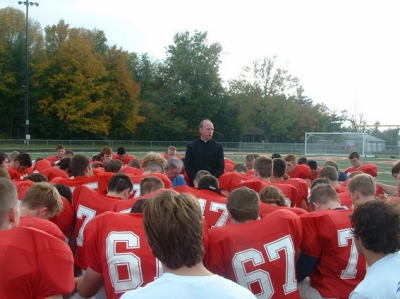Athletics has the potential to lead to a deeper understanding of the need for mercy in our lives. It offers a transformative lens through which to explore life’s most significant questions: Who am I? What is my place in this world? Research documents that this quest for discovery during the late adolescent and early adult years reveals the hunger these young people have for spiritual nourishment (Astin & Astin, 2010). When these questions go unanswered, that spiritual hunger is not satisfied and the spirit suffers. Spiritual suffering is humanity’s greatest suffering because it deprives a fullness of life in God (Cokeley, 2015).
Sport, when properly directed, can help ease spiritual suffering because sport offers opportunities to open our hearts and minds to the role we have in responding to God’s offer of mercy. There are beautiful acts of mercy happening every day in our sport arenas that unfortunately go unrecognized therefore, denying our young athletes meaningful opportunities to explore their spiritual questions. Loud fans, harsh opponents, and a distorted view of competition and winning can be distracting and take eyes off the ultimate prize.
Hidden in plain sight is an expression we like to use at Neumann University, a Catholic Franciscan university located just outside of Philadelphia. Sometimes it is difficult to recognize God’s presence in an “ordinary” experience if its significance is not highlighted. For example, last year I had the privilege of visiting Rome for the first time and participated in a tour of the necropolis beneath the Vatican. Near the end of the tour, my group was brought to a small, nondescript shrine. Thanks to the tour guide, I became aware that this plain and simple site held profound, sacred meaning. That nondescript shrine contained the bones of St. Peter, the literal and figurative rock on which our Church is built. If not for the tour guide, would I have otherwise walked past this sacred treasure not realizing the profound artifact that stood a few feet in front of me?
When I reflect on that experience, I can’t help but recall my time in front of St. Peter’s tomb and the similarities it holds with sports. Who are the “spiritual tour guides” on an athlete's journey through sports? Who can help athletes awaken to God's endless offer of mercy, so beautifully entrenched in the day-to-day grind of training and competition? Should it be the coach? Parents? Trainer? Team Chaplain?
Recently, a playoff basketball game between two teams of 16- and 17- year-old boys in suburban Philadelphia spontaneously evolved into a series of merciful acts whose effects are still being felt today. From the playing of every team member on the bench to the inclusion of a young person with special needs, these spontaneous acts of mercy inspired many people of God’s presence in their lives. When this story was brought to the attention of the Neumann University Institute for Sport, Spirituality and Character Development, staff members mobilized to bring this story to a wider audience and published it on the Institute’s website. The reaction to the published story has been tremendous, resulting in the most popular piece of content ever published on the website.
One of the young men who played in that game was truly amazed at the reaction by so many people because he felt it was just the players’ natural response. His parents explained that this experience serves as an inspiring lesson to many other teams and coaches who would not have reacted the same way. One of the coaches who was involved with the game was quick to give credit to the families of the players for having raised those boys to value and protect the dignity of life. This example beautifully illustrates that parents and coaches have a shared and sacred responsibility to guide these young people by identifying the meaningful and merciful acts hidden in plain sight on their athletic journey. The obligation does not begin nor end with parents and coaches. Athletics administrators, trainers and team chaplains are also accountable.
In his remarks last December preceding the opening of the Holy Door of St. Peter’s Basilica, Pope Francis said:
To pass through the Holy Door means to rediscover the infinite mercy of the Father who welcomes everyone and goes out personally to encounter each of them...In passing through the Holy Door, then, may we feel that we ourselves are part of this mystery of love, of tenderness...let us experience the joy of encountering that grace which transforms all things.
Imagine if all who are involved in sports view crossing the threshold to enter the field of play with the same reverence as passing through a Holy Door of Mercy. This Extraordinary Jubilee of Mercy calls on us to envision the arena each athlete enters as sacred space and spiritual opportunity to celebrate all of God’s blessings including His gift of endless mercy.
By Lee Mirenda DelleMonache, Ph.D. Candidate
dellemonl@neumann.edu
Director, Neumann University Institute for Sport, Spirituality and Character Development



